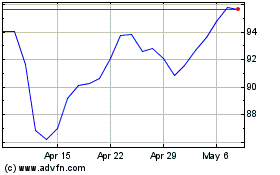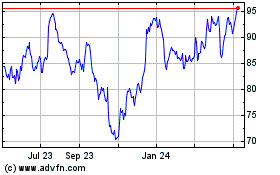By Michael Wursthorn
This article is being republished as part of our daily
reproduction of WSJ.com articles that also appeared in the U.S.
print edition of The Wall Street Journal (July 28, 2017).
Wall Street brokerages have been selling billions of dollars in
loans backed by stocks and bonds, a trend that yields lucrative
fees for the firms but poses risks for borrowers.
While banks don't always report these loans in the same way,
these securities-backed loans total at least $100 billion for the
biggest brokerages -- up exponentially since the financial crisis
-- with several billions of dollars of additional debt held at
smaller brokerages, banking analysts estimate.
Executives at Morgan Stanley earlier this month highlighted
these loans to individuals as a big growth area and revenue driver,
saying the loans helped expand the bank's overall wealth lending by
about $3.5 billion, or 6%, in the second quarter. On Thursday,
Goldman Sachs Group Inc. took a step toward expanding its
securities-based lending business through a new partnership with
Fidelity Investments.
The loans work a lot like margin loans. Brokerages lend against
the value of an investor's portfolio. But unlike margin lending,
customers don't use the debt to buy more securities. Brokerage
executives say the loans can help clients avoid selling assets. The
client can get cash without shifting their investments; they also
avoid potentially locking in losses or incurring taxable gains, or
missing out on future stock market gains. Clients are also able to
borrow money at relatively low interest rates because the loans are
secured.
"Securities based loans can be a valuable financial planning
tool for appropriate clients," a Morgan Stanley spokesman said.
Critics worry that the surging stock market has made investors
numb to the risks of borrowing against their investments -- a
scenario that has played out before. In the runup to the Great
Depression, the dot.com bubble of 2000 and the financial crisis,
investors binged on margin debt that proved perilous when stocks
tumbled.
Investors using these loans now could face a similar fate if
markets tank and the value of their collateral shrinks, prompting
the bank to demand repayment. If the margin call isn't met, the
securities backing the loans are sold and the borrower is
responsible for any remaining balance.
For brokerages, these loans have become a reliable source of
revenue in the years since the financial crisis, as firms have
begun moving from a business model of charging commissions for
trading to a system of fees based on assets under management. The
loans themselves help brokers retain these assets because customers
don't have to sell stocks and other securities when they need cash.
These loans have also become a big factor in brokers'
compensation.
Several Merrill Lynch brokers said they have asked longstanding
clients to open a securities-backed line of credit to help them hit
bonus hurdles, assuring that clients wouldn't need to use it or pay
any fees for opening it. Merrill brokers receive continuing
payments for getting clients to tap credit lines, and those loan
balances contribute to year-end bonus calculations, people familiar
with the matter said.
Brokerage executives have said the longer a client has one of
these loans tied to their account, the more likely they are to use
it.
"We were dramatically pushed to put these on all of our client
accounts, " said Steven Dudash, a former Merrill Lynch broker who
has been managing his own investment-advisory firm since 2014.
"Whenever you're product-pushing, it's not in the client's best
interest."
Merrill representatives say its brokers offer these loans to
clients in a responsible manner, including disclosing the risks and
fees.
"If people need the money, they should sell securities," said
Terrance Odean, a professor of finance at the Haas School of
Business at the University of California, Berkeley. "It's very
risky to take a leveraged position in the market, and I don't think
people are thinking about it that way."
Wells Fargo & Co. recently changed practices around how
brokers pitch lending products. Starting this year, Wells Fargo
stopped offering brokers bonuses tied to how many loans, including
securities-backed debt, they opened for clients, executives of the
bank have said.
As of the end of 2016, clients of Bank of America Corp.'s wealth
unit, which includes Merrill Lynch and private bank U.S. Trust, had
some $40 billion in such loans outstanding, up 140% from 2010.
Morgan Stanley's customers had $30 billion in these loans, more
than double from 2013. UBS Group AG and Wells Fargo also have made
billions of dollars in such loans, people familiar with those banks
said.
Morgan Stanley's finance chief, Jonathan Pruzan, said while
discussing earnings this month that the bank expects more clients
to take out loans in the months ahead. "That's been a real key
driver of our wealth business," he said.
The growth of securities-backed loans has drawn the attention of
regulators, who have questioned the brokerages' marketing and sales
efforts as well as the suitability of the loans.
Merrill opened more than 121,000 such loan accounts between 2010
and 2014 with more than $85 billion in total credit extended,
according to a Financial Industry Regulatory Authority settlement
order last year. In the matter, Finra alleged that Merrill didn't
fully explain the risks of securities-backed loans and used risky
or concentrated investments as collateral.
Merrill settled its case without admitting or denying the
allegations. Merrill reported its securities-lending oversight
lapses to Finra initially and cooperated with the regulator's
inquiry, according to Merrill representatives. They said the firm
has improved its procedures.
In another regulatory action, the Massachusetts securities
watchdog last year accused Morgan Stanley of developing a sales
program that encouraged brokers to pitch these loans regardless of
whether clients needed them. Brokers involved in the incentive
program were given scripts coaching them to offer securities-backed
loans to clients who said they needed to pay taxes or cover
expenses for a wedding or a graduation party, or if they mentioned
"purchasing a luxury item like a car or yacht," according to the
regulator.
"It's not healthy for the industry," said William Galvin,
Massachusetts' top securities regulator, who has been investigating
how firms motivate brokers to push these loans. Brokerages "should
be more concerned about this," he said, "but they're in favor of
competition and seeing who can get more loans."
Morgan Stanley agreed to a $1 million settlement with the
regulator in April without admitting or denying wrongdoing. A
Morgan Stanley spokesman said Massachusetts found no evidence that
any clients were harmed or that any of the loans were unsuitable or
unauthorized.
"We have taken steps to strengthen and clarify our policies and
controls around such initiatives," he said.
Write to Michael Wursthorn at Michael.Wursthorn@wsj.com
(END) Dow Jones Newswires
July 28, 2017 02:47 ET (06:47 GMT)
Copyright (c) 2017 Dow Jones & Company, Inc.
Morgan Stanley (NYSE:MS)
Historical Stock Chart
From Mar 2024 to Apr 2024

Morgan Stanley (NYSE:MS)
Historical Stock Chart
From Apr 2023 to Apr 2024
